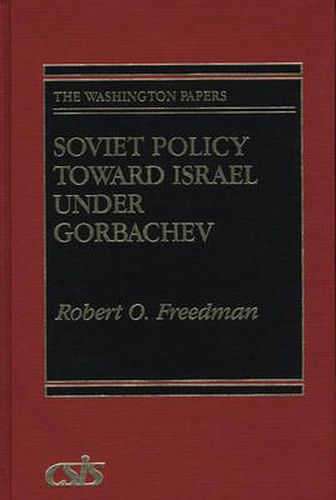Readings Newsletter
Become a Readings Member to make your shopping experience even easier.
Sign in or sign up for free!
You’re not far away from qualifying for FREE standard shipping within Australia
You’ve qualified for FREE standard shipping within Australia
The cart is loading…






Mikhail Gorbachev’s rise to power in 1985 signalled the beginning of significant improvements in Soviet-Israeli relations. Based on analysis of Soviet behaviour and interviews with Israeli and Soviet Foreign Ministry officials and PLO leaders, this study describes how eased tensions between the Soviet Union and Israel have been achieved, and analyzes the Soviet Union’s reasons for advancing diplomatic relations with Israel. Robert Owen Freedman follows the progress of Soviet policy from the 1987 arrival of the Soviet consular delegation in Israel, which heralded rapid improvement on the diplomatic front, through 1989 trade agreements, cultural, academic, and athletic exchanges, and 1990 political meetings between high ranking officials. Freedman’s identification of the four primary goals which positively directed these Soviet initiatives towards Israel is central to the study as it recognizes the Soviet desire to become active in the Middle East peace process and to favourably influence domestic and worldwide opinion. Both meticulously documented and forward-looking, the conclusions reached can stimulate discussion and provide a basis for further study for members of the academic, political, and diplomatic communities.
$9.00 standard shipping within Australia
FREE standard shipping within Australia for orders over $100.00
Express & International shipping calculated at checkout
Mikhail Gorbachev’s rise to power in 1985 signalled the beginning of significant improvements in Soviet-Israeli relations. Based on analysis of Soviet behaviour and interviews with Israeli and Soviet Foreign Ministry officials and PLO leaders, this study describes how eased tensions between the Soviet Union and Israel have been achieved, and analyzes the Soviet Union’s reasons for advancing diplomatic relations with Israel. Robert Owen Freedman follows the progress of Soviet policy from the 1987 arrival of the Soviet consular delegation in Israel, which heralded rapid improvement on the diplomatic front, through 1989 trade agreements, cultural, academic, and athletic exchanges, and 1990 political meetings between high ranking officials. Freedman’s identification of the four primary goals which positively directed these Soviet initiatives towards Israel is central to the study as it recognizes the Soviet desire to become active in the Middle East peace process and to favourably influence domestic and worldwide opinion. Both meticulously documented and forward-looking, the conclusions reached can stimulate discussion and provide a basis for further study for members of the academic, political, and diplomatic communities.